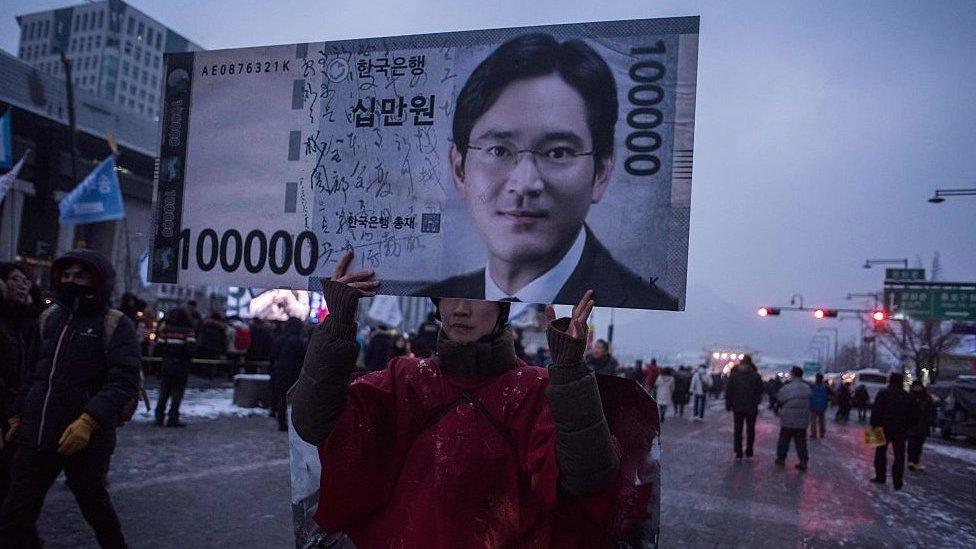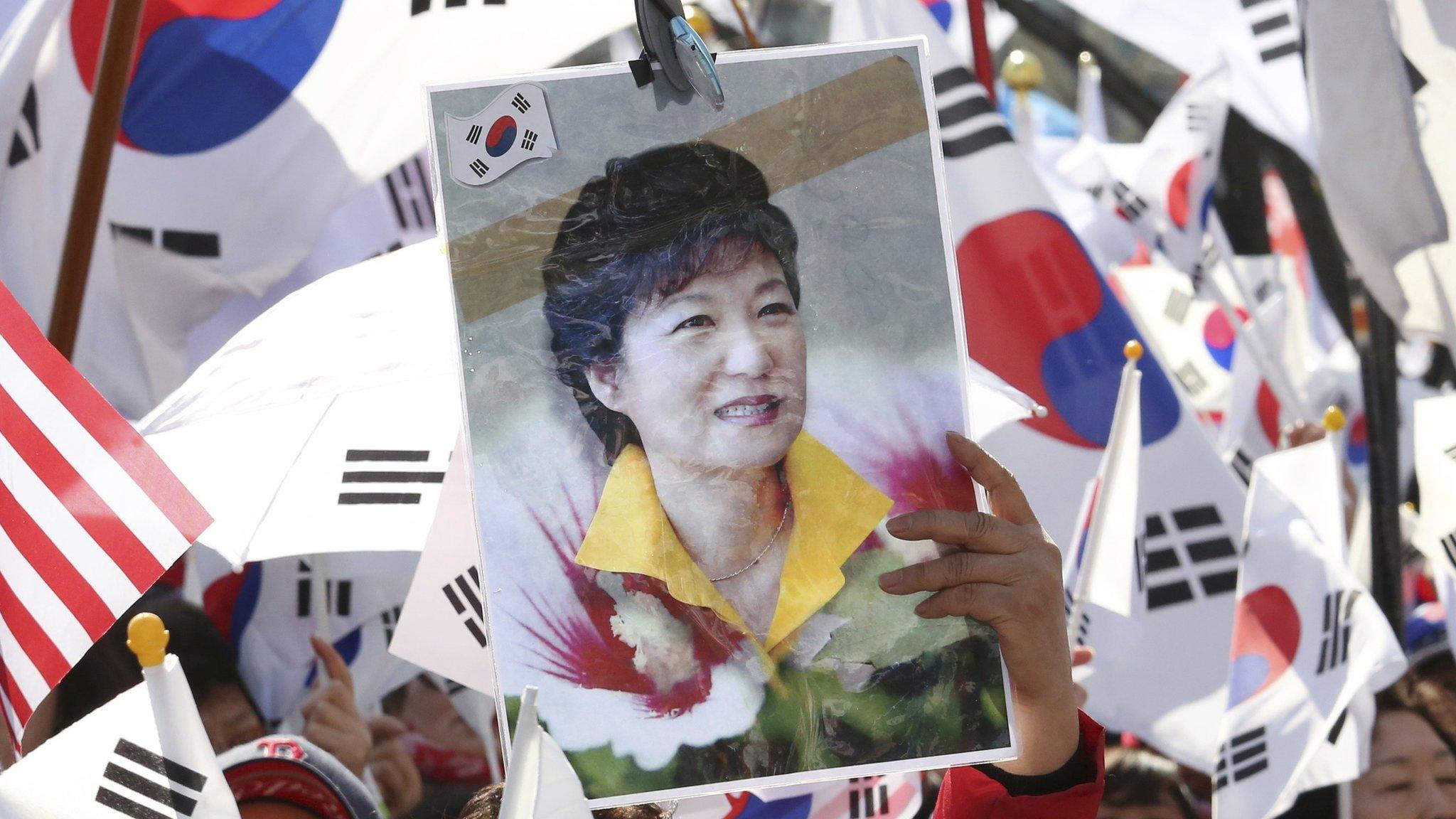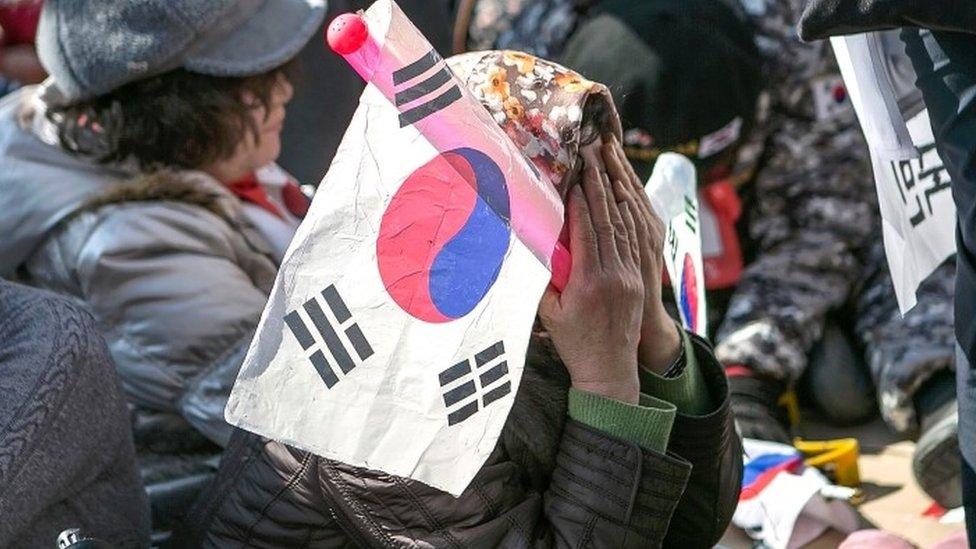Is real reform possible at South Korea's chaebols?
- Published

You just have to walk down the streets of Seoul to see how pervasive is the influence of South Korea's massive family-run business empires - or chaebols as they're known.
Samsung, Lotte, LG, Hyundai: they are unavoidable, selling everything from mobiles to laptops, cars to washing machines as well as food, drink and even health insurance.
Staggeringly, sales revenue from the top five chaebols are worth more than half of South Korea's entire economy.
But increasingly these empires have come under the spotlight because of the influence they wield (the word chaebol is a combination of the Korean words for "wealth" and "clan").
Calls for them to be reformed have come and gone before, but as South Koreans head for a presidential election, could this time be different?
'Wealth monopolised'
At a recent protest in Seoul I watched scores of young people raise their arms and voices against chaebols and the powerful position they hold in the country.

Chaebols are often the focus of protests - such as this one in January against Samsung heir Lee Jao-Yong
In the crowd, I met Kim Seung-yeon, a young part-time worker who was there to campaign for better pay and working conditions.
Like many young Koreans, she told me the system feels stacked in favour of the chaebols.
"Right now chaebols monopolise too much of the wealth in South Korea, and it isn't being used properly," she said to me. "I think this needs to be corrected."
The frustration over the close ties between business and politics has only grown through the complex corruption scandal that has engulfed the nation.
South Korea's President Park Geun-hye, and the heads of Samsung and Lotte, two of the country's biggest chaebols have all been charged with bribery.
But these very same businesses helped to build South Korea at a time when the country was emerging from a war and they are vital to the economy.
Ticket to success
Nowhere was that made more apparent to me than at a study centre in the capital.
There I met a group of young women who were all preparing for entrance exams to get jobs with chaebols.
It is a rigorous and exhaustive process.
But in South Korea's ultra-competitive society, it is also a ticket to success.
"If I get into a chaebol it means that I will have a well-paid job, and people will look at me and think 'wow'," explains Kang Da-heun who was studying to get a job with Lotte. "It will help me with my marriage prospects, and my future will be very bright."
Did it bother her, I asked, that the boss of Lotte might potentially go to prison for his role in a long-running corruption scandal?
"It won't affect the company's prospects at all," she said to me. "Lotte will keep being Lotte."
'Everyone benefits'
On the face of it, she appeared to be right, as I learned from a visit to Lotte's massive department store complex and the new premises of the Lotte World Tower.
It's the tallest building in the country, at almost 500m high. It opened its doors a few weeks ago, against the backdrop of the bribery charges levelled at the company's boss.
Lotte and other chaebols say they are changing, and trying to improve corporate governance at their firms, but also point to the fact that they are responsible for a sizeable portion of growth in the economy.

The opening of the Lotte World Tower was a low-key affair...
"At the moment chaebols have this negative image," Hwang Kag-gyu, head of Lotte's corporate innovation office told me.
"But we feel partially falsely charged. It was necessary [in South Korea's history] for big companies to grow... I believe everyone benefited from these mutual growth partnerships."
Stifling small business?
Not everyone feels that way though.
A few hours outside Seoul, in the city of Gwangju, I met Cho Seong-gu, who used to own a fairly small, but he says thriving, software business.
To expand, he partnered with a chaebol and when there was a dispute over the terms of the deal, Mr Cho lost everything - his business, his house, even his marriage.
He blames the culture of chaebol-worship in South Korea for his problems.
"I have fought for 15 years," he told me in his tiny flat. "I have met more than 170 congressmen, my case has even been discussed in the national assembly and featured countless times in the media. It's impossible in Korea for a small business to win against a chaebol."
Back on the 123rd floor of the Lotte World Tower, hordes of local tourists gathered to take selfies and marvel at the city below. Much of what they were looking at was built by chaebols, an achievement only these sprawling empires could pull off.
As I watched from the sidelines, it struck me that the relationship between Koreans and their chaebols is a complicated one, and that any hope of real reform is going to be a long and difficult process.
Chaebols are an essential part of South Korea's economy, and helped to transform what was once a poor nation into Asia's fourth largest economy.
But along the way, their tentacles have spread into pretty much every single sector of business, meaning they are now towering giants, overshadowing everything in their sight.
- Published10 March 2017

- Published10 March 2017
